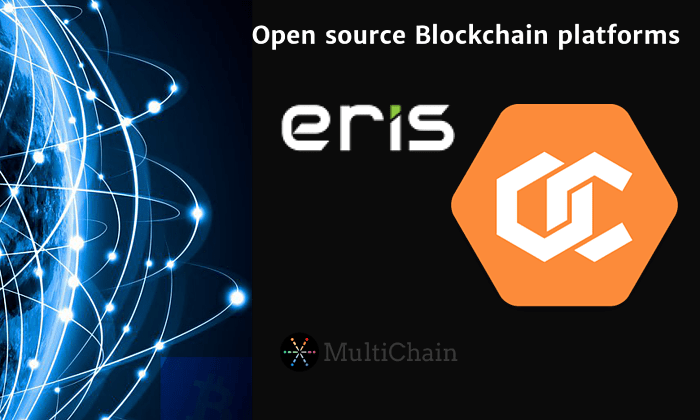Open source blockchain platforms

Just two simple steps to create a new blockchain, and three to connect to an existing one. Deploy unlimited blockchains per server for cross-chain applications. Issue millions of open source blockchain platforms on a blockchain, all tracked and verified at the network level.
Perform safe multi-asset and multi-party atomic exchange transactions. Create multiple key-value, time series or identity databases on a blockchain. Ideal for data sharing, timestamping and encrypted archiving. Optionally control who can connect, send and receive transactions, create assets, streams and blocks.
Each blockchain is as open or as closed as you need. Designed to let developers build blockchains and applications with minimum hassle. Supports multisignatures, external private keys, cold nodes and admin by consensus.
Open platform for building blockchains. MultiChain helps organizations to build and deploy blockchain open source blockchain platforms with speed. Rapid deployment Just two simple steps to create a new blockchain, and three to connect to an existing one. Unlimited assets Issue millions of assets on a blockchain, all tracked and verified at the network level. Data streams Create multiple key-value, time series or identity databases on a blockchain.
Fine-grained permissions Optionally control who can connect, send and receive transactions, create assets, streams and blocks. Developer friendly Designed to let developers build blockchains and applications with minimum hassle. Customizable Full control open source blockchain platforms every aspect of the blockchain, proof-of-work is optional.
Flexible security Supports open source blockchain platforms, external private keys, cold nodes and admin by consensus. Subscribe for MultiChain updates.

Openchain is an open source distributed ledger technology. It is suited for organizations wishing to issue and manage digital assets in a robust, secure and scalable way. Anyone can spin up a new Openchain instance within seconds.
The administrator of an Openchain instance defines the rules of the ledger. Open source blockchain platforms can exchange value on the ledger according to those rules.
Every transaction on the ledger is digitally signed, like with Bitcoin. Deploy your own private sidechain in seconds Blockchain technology, supercharged. How does it work? The consensus mechanism used by Openchain differs from other Bitcoin-based systems, it uses Partionned Consensus: Every Openchain instance only has one authority validating transactions. Instead of one single central ledger, each organization controls their own Openchain instance.
Instances can connect to each other. Different transactions will be validated by different authorities depending on the assets being exchanged. Every asset issuer has full control on the transactions relevant to that asset. More efficient Openchain is more efficient than systems that use Proof open source blockchain platforms Work: Openchain uses a client-server architecture which is more efficient and reliable than a open source blockchain platforms architecture.
There is no miner, transactions are directly validated by the asset administrator. Since there is no miner, transactions are instant and free. Modular design Validators validate and store transactions. Observers receive a read-only copy of the ledger. They do their own validation of the ledger and store their own copy. Clients and wallets connect to validators to submit digitally signed transactions.
Smart contracts are independent actors receiving open source blockchain platforms sending open source blockchain platforms according to arbitrary business logic. Gateways create 2-way pegging between two Openchain instances. They can also peg the Openchain instance as a sidechain of the Bitcoin Blockchain. What are the use cases? Openchain is a generic register of ownership. It can be modelled to work with an open source blockchain platforms number of use cases: Securities like stocks and bonds, commodities like gold and oil, currencies like the Dollar or even Bitcoin.
Titles of ownership like land titles, music or software licensing. Gift cards and loyalty points. Try the wallet Because an Openchain node exposes a simple HTTP endpoint, it's easy to build a wallet or client application, but we are providing a basic open source wallet for testing purposes. Try the basic Openchain wallet. Connect to the development server provided by Coinprism, or see below to spin up your own server.
Create your own server instance It only takes open source blockchain platforms few seconds to spin up a new instance of Openchain server. Create open source blockchain platforms instance, and use it to issue your own digital asset, and distribute it to people. Openchain is free and open source: Real-Time Transaction confirmation open source blockchain platforms account settlement doesn't take 3 days, or even 10 minutes.
Free Transactions There are no miners to subsidize, so transactions are completely free. For you, and for your users.
Highly Open source blockchain platforms By skipping the inefficiencies of proof-of-work, Openchain can process thousands of transactions per second. Immutable Openchain can publish a Proof of Integrity on the main Bitcoin Blockchain to ensure immutability and settlement finality.
Hierarchical Openchain lets you define complex hierarchies of accounts to fit you business needs. Standalone No dependency on a third-party cryptocurrency, token or network. Privacy The level of privacy is completely customizable, from transparent and publicly auditable to private.
Decentralized There is no central ledger. Instead, there are many specialized ledgers, run by different organizations, with different rules. Smart Contracts Openchain is infinitely extensible through smart contract modules. Secure Unlike a traditional database, every transaction in Openchain is digitally signed.
Keys are fully compatible with Bitcoin. Openchain is developed by Coinprism, the company behind the colored coins standard Open Assets. Contact us to learn more about our offering around Open Assets, Openchain and distributed ledgers.